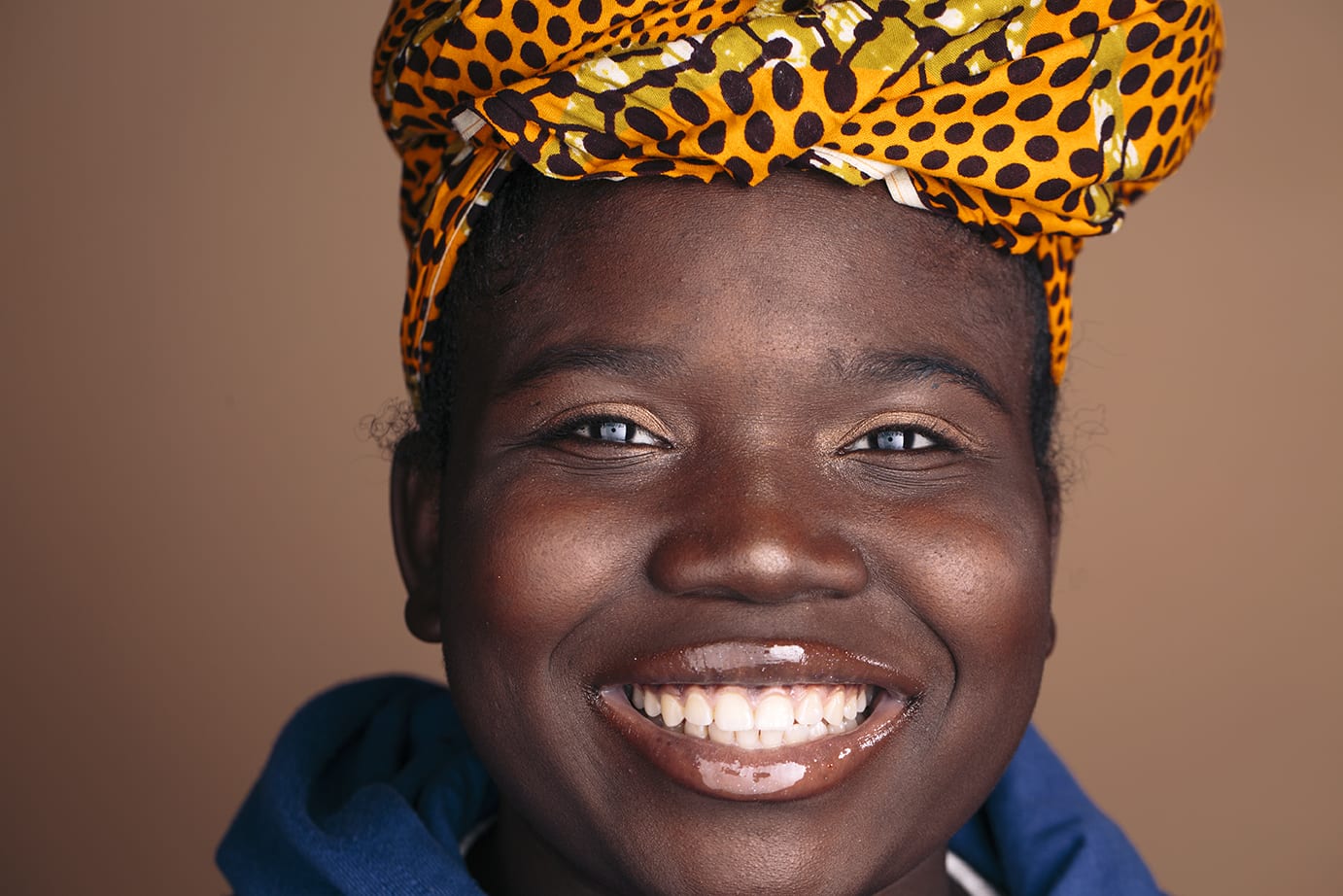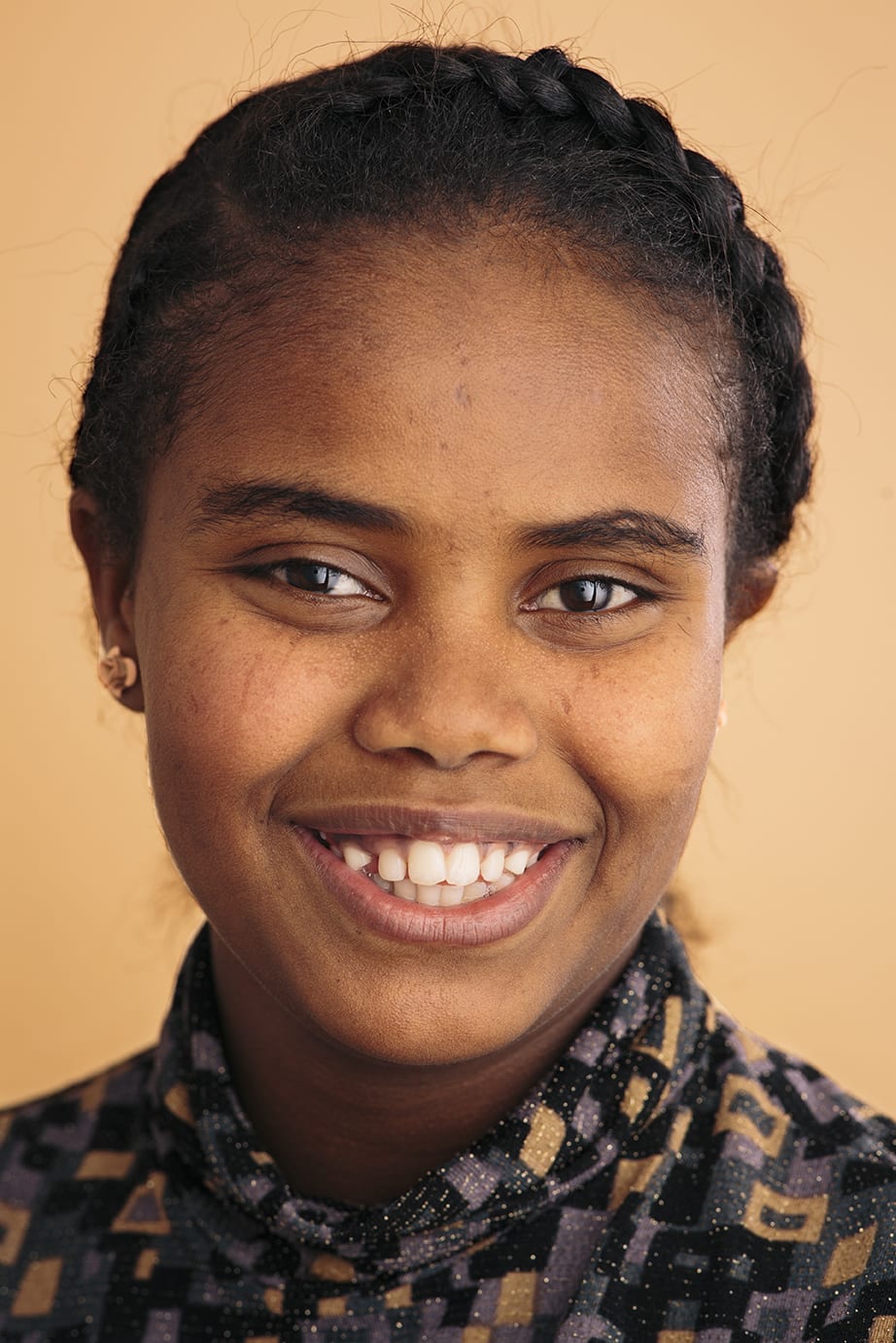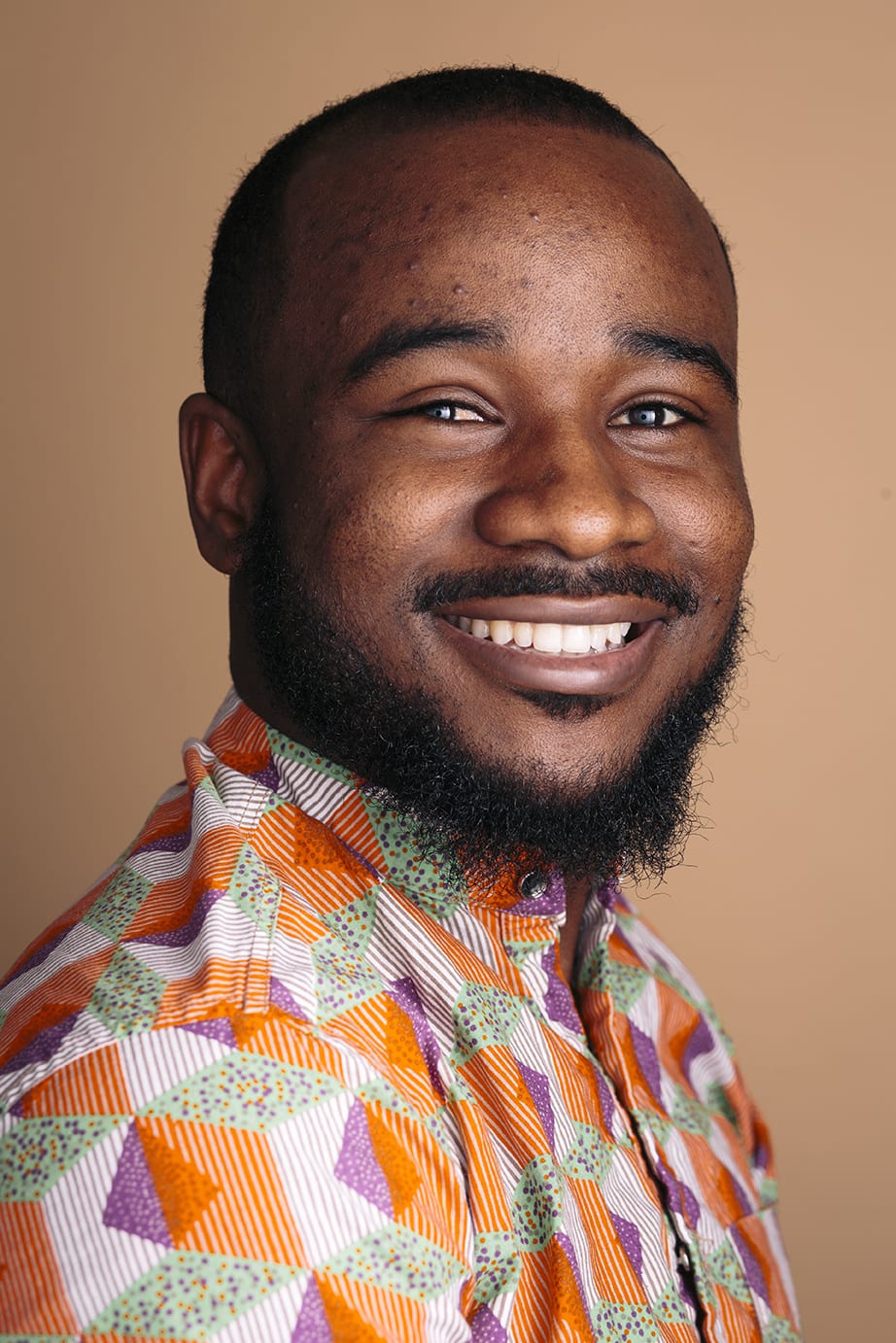 Fotografía de Michelle Kanaar/Borderless Magazine.
Fotografía de Michelle Kanaar/Borderless Magazine. Tras huir de un conflicto, los jóvenes africanos que llegan a Chicago se encuentran con una ciudad que lucha contra el racismo, la desigualdad y la violencia. He aquí tres de sus historias.
Este reportaje ha sido publicado conjuntamente por Borderless Magazine y The TRiiBE
En 2018 llegaron más refugiados de África a Estados Unidos que de cualquier otra región. Huyendo de conflictos y gobiernos inestables, proceden de la República Democrática del Congo, la República Centroafricana, Eritrea, Sudán y otros países. En general, son jóvenes: casi el 60% de todos los refugiados que llegaron a Estados Unidos en 2018 tenían menos de 25 años.
Cuando llegan a ciudades como Chicago, los jóvenes refugiados africanos arrastran el trauma de haber huido de su país de origen y haber vivido en campos de refugiados durante años en muchos casos.
"La mayoría de estos niños han sufrido traumas en cada uno de los niveles de su viaje hasta aquí", explica Rebecca Ford-Paz, psicóloga clínica infantil del Centro para la Resiliencia Infantil. "Estos niños ya no están rodeados de su red de apoyo social y han sido trasladados a un nuevo país con nuevo idioma y nuevas costumbres, nuevo sistema médico y nueva escuela. Están bastante aislados. Y ahora pueden estar experimentando la discriminación y el racismo quizás por primera vez".
En el caso de los refugiados africanos en Chicago, pueden encontrarse con algunos de los mismos retos a los que se enfrentan aquí otros jóvenes negros, como el racismo, la desigualdad, las bandas y la violencia armada.
"Los problemas del encarcelamiento y la falta de acceso al empleo afectan a nuestros jóvenes", declaró Nancy Asirifi-Otchere, directora ejecutiva de la Organización de África Unidauna coalición de organizaciones comunitarias africanas que promueve la justicia social y económica, la participación cívica y el empoderamiento de los inmigrantes y refugiados africanos en Illinois.
"Algunos de ellos, especialmente nuestros chicos, debido a la presión de sus compañeros, acaban en compañía de la gente equivocada y se encuentran en el centro de otros problemas que afectan a la comunidad negra en general", dijo Asirifi-Otchere.
Revista Borderless se reunió con tres jóvenes africanos en Chicago para escuchar cómo afrontan los retos de ser un joven refugiado africano en Estados Unidos.
Fotografía de Michelle Kanaar.
Antoinette Mpawenayo, 18 años, burundesa de Tanzania
Mpawenayo llegó a Estados Unidos con su familia en 2008. Hoy cursa el último año de secundaria en el barrio Edgewater de Chicago. En su tiempo libre, enseña circo y da clases particulares a alumnos de primaria.
Contada a Nissa Rhee
El primer recuerdo que tengo de mi llegada a Estados Unidos es la acogida de las diferentes personas de Chicago, especialmente de mi Refugiado Uno comunidad. Me fijé en muchos edificios, coches y caras diferentes. En mi país sólo hay un color. Pero en Chicago ves todo tipo de colores, todo tipo de culturas y razas. Sinceramente, me pareció muy bonito.
Cuando llegué a Estados Unidos, me acosaban mucho.
Realmente me cambió. No querían conocerme como persona. Cuando me acosaban en la escuela primaria, eso me hizo más fuerte. Me hizo querer ser mejor persona porque la forma en que me trataban no me hacía sentir bien. Así que quiero hacer el bien a los demás. Estoy segura de que hay mucha gente en el mundo que está pasando por lo mismo que yo y quiero estar ahí para ellos.
Con mi familia es muy difícil porque mi madre y mi padre no hablan inglés, [hablan kirundi y kiswahili]. No saben mucho de lo que pasa en este mundo porque muchas cosas se dicen en inglés y en una cultura a la que no están acostumbrados.
Me duele porque tienen la gran idea de que los negros y los africanos son los culpables de esta violencia armada. Y por mucho que me gustaría explicar que no, que nosotros no tenemos la culpa de esto, ellos tienen estos estereotipos.
Pero hay violencia armada. Vine a este país para huir de la violencia armada que había en mi país. Escapar de la violencia y luego venir a esta violencia, era como si no tuviera sentido. Podría haberme quedado en mi país.
El año pasado, mi hermana y yo íbamos caminando hacia un restaurante etíope de la avenida Wilson y tuve el mal presentimiento de que algo malo iba a ocurrir. Le dije a mi hermana: "Acelera". Así que empezamos a acelerar, entramos y dos minutos después se oyó un disparo delante del restaurante.
Y yo estaba como, "Wow, wow, wow, wow". ¿Qué demonios? ¿Cómo tuve ese instinto de que esto iba a pasar y le dije a mi hermana menor que debíamos acelerar?
Mi hermana también lo experimentó. Estaba en una tienda y casualmente había un tipo armado. Ella me envió un mensaje de texto, "Tengo miedo, no sé qué hacer." Y finalmente sale y dice: "¡Me están siguiendo!" Tenía mucho miedo de perder a mi hermana. Me daba mucho miedo.
Muchos africanos han sido influenciados para unirse a bandas y meterse en drogas después de venir aquí. Intento mantener a mi hermano pequeño cerca para demostrarle que le quiero. Quiero que sea fuerte y que sea él mismo. A veces es difícil ser uno mismo.
Fotografía de Michelle Kanaar.
Hiermiela Tesfayonannes, 15 años, eritrea
Tesfayonannes es originaria de Eritrea. Ella y su familia quedaron atrapados en Etiopía cuando intentaban visitar a su abuela enferma y no pudieron regresar a Eritrea. Llegaron a Chicago desde un campo de refugiados en Etiopía cuando ella tenía 12 años. Va al colegio en el barrio Rogers Park de Chicago y vive en West Ridge.
Contada a Michelle Kanaar
La comida americana me sorprendió mucho. No comemos ese tipo de comida. Pero ahora me encanta. Tienes que ser como los demás, así que dices: "Déjame probar algo nuevo, déjame encajar". Simplemente haces cosas para encajar y yo hice exactamente eso. Solía odiar la pizza, de verdad. Cada vez que olía pizza quería vomitar. Pero ahora estoy obsesionada.
Cuando llegué aquí, fui a un colegio público. Entonces no sabía hablar inglés y había un grupo de chicas que se burlaban de mí. Yo entendía lo que decían, pero no podía hablar.
Lo entiendo, ¿sabes? Se sorprendían de que yo fuera diferente. Solía llevar comida y ellos odiaban su olor y se quejaban. Cada vez que quería ir al baño era como "Yo. Baño. Yo. Baño". Realmente no sabía cómo hablar.
Se reían de mí y esas cosas. Cuando se lo conté a mi madre, se puso muy triste. Entonces oyó hablar de una escuela católica muy bonita y fui allí.
Cuando fui a St. Thomas, aprendí inglés muy rápido. Me dije: "A partir de ahora, voy a demostrar a los niños que soy inteligente, que sé decir cosas". ¿Sabes lo que quiero decir? Creen que los niños refugiados son muy tontos porque no hablan inglés. No toda la gente, pero la mayoría.
En mi [actual] colegio, me encanta estar allí. Tengo muchos amigos. Hay una mesa entera de mis amigos en el almuerzo y nos estamos riendo y no podemos estar callados.
Recuerdo que el primer boletín de notas decía: "Sé que tu hija es lista, pero habla en clase". Y mi padre me dijo: "Tienes que dejar de hablar". Y yo estaba como "No puedo". Quiero decir que estoy hablando Inglés, esto es un milagro para mí. Me encanta hablar en inglés.
Oigo en las noticias que hay mucha violencia. Pero nunca me ha ocurrido a mí, ni a mis amigos, ni a las personas que están cerca de mí. Así que estoy agradecida por ello. Oigo que están ocurriendo muchas cosas malas y me gustaría que todo acabara.
Me preocupan las personas que resultan heridas y las que les hacen daño. Me preocupa que vayan a la cárcel por ello. Me preocupa que las personas que resultan heridas puedan morir y dejar una marca en las personas que las quieren. Su familia. Sus amigos.
Cuando me enteré de que venía a Estados Unidos, me hizo mucha ilusión. Solíamos pensar que América era como el paraíso. Cuando veíamos películas tenían casas muy buenas, piscinas muy buenas. Pensábamos: "Cuando vayamos a América, tendremos de esas". Pero lo gracioso es que no fue así.
Al principio nos gustaba nuestra casa, pero cuando llegó el invierno nos dimos cuenta de que había goteras en el techo y de que no controlábamos la calefacción. Nuestra siguiente casa era bonita y grande. Pero estaba en otra zona de la ciudad. Mi madre sintió que tenía que trasladarnos porque la gente le decía que no era el lugar más seguro para vivir. Ahora vivimos en Devon y nos gusta más. Aunque no se parecía a lo que nos habían mostrado las películas, estoy agradecida por lo que tenemos.
Fotografía de Michelle Kanaar.
Hafashimana Obedi, 24 años, burundés procedente de Tanzania y la República Democrática del Congo
Obedi nació en un campo de refugiados de la República Democrática del Congo. Su familia, originaria de Burundi, huyó a Tanzania cuando él tenía tres años. Su padre era religioso y no quería participar en la guerra étnica de Burundi. Más tarde, cuando estalló la guerra también en la RDC, la familia huyó a Tanzania. Obedi vivió en un campo de refugiados en Tanzania hasta los 13 años y luego vino a Chicago. Actualmente trabaja a tiempo completo en el aeropuerto O'Hare como cocinero y a tiempo parcial como intérprete en el Centro Marjorie Kovler. Vive con su madre y su hermano en el barrio Rogers Park de Chicago.
Contada a Michelle Kanaar
En cuanto llegué aquí había nieve. Esa fue la primera gran diferencia para mí. En Tanzania hace mucho, mucho calor. Las cosas son totalmente diferentes. En el campo de refugiados se vive con lo básico. Sólo tienes tiendas y es un proceso de espera, así que no tienes mucho. En el campo de refugiados en el que estábamos no te dejaban salir. Cuando llegué aquí vi todos estos edificios. La diferencia era enorme. Los perros también. En Tanzania a la gente no le gustan los perros. Cuando ves un perro, huyes de él. Pero cuando llegué aquí fue lo primero que noté. Todo el mundo en la calle tenía perros y todo el mundo quería acariciarlos.
Al principio no entendía nada. En casa aprendíamos francés en la escuela. Aquí era totalmente diferente. No sabía nada en inglés. Academia de Matemáticas y Ciencias de Chicago [donde estudié] es un lugar muy acogedor para los inmigrantes. Tienen muchos inmigrantes, así que no es nada nuevo. El programa de ESL es enorme y se esfuerzan mucho para que los que no hablan inglés tengan éxito. La mayoría de mis profesores eran extranjeros. Eran turcos o hispanos, así que sabían lo que era ser inmigrante. También hablaban otro idioma. Eso también nos ayudó.
Vas a la escuela y no conoces a nadie. No tienes amigos e intentas hacerlo lo mejor que puedes y ya está. A veces mi hermano y yo nos metíamos en peleas con los otros alumnos cuando se metían con nosotros. Como no podíamos defendernos, siempre acabábamos metidos en líos. Porque uno admite su culpa aunque no haya empezado nada. Sólo te defendías. Lo entendíamos y no era nada contra el profesor, pero no sabíamos explicarnos.
A veces las cosas se malinterpretaban. Como los chicos que trataban de estar bien con nosotros y entendían que estábamos pasando por un momento difícil trataban de ser amigos nuestros. Ellos decían: "Oh, ¿qué pasa perro?" Pero para nosotros era ofensivo. Porque un perro en Tanzania es lo más bajo de la sociedad. Lo más bajo que te pueden llamar. Pero aquí, la gente quiere que le llamen perro y es como "Ah, no". Pero es algo que le dices a tu colega o a tu amigo, ¿no?
Estar en un país nuevo ya es estresante de por sí. Y nuestros padres están tan perdidos como nosotros. No se les puede pedir mucho. No conocen la cultura ni el idioma y no pueden ayudar a sus hijos como quisieran. Así que los niños se las arreglan solos e intentan hacer lo que creen que es correcto. La mayoría de las veces, se limitan a seguir a sus iguales. Y sus compañeros están tan perdidos como ellos y no conocen nada mejor.
Sé que muchos de los jóvenes de África Oriental con los que solía salir tomaron un camino diferente en la vida. Creo que fue porque no tenían mentores. [Hay] presión de grupo para unirse a bandas y presión de grupo para ser sus amigos. Quieren ser guays. Quieren encajar. Sobre todo si no hablas el idioma y ves que esta gente tiene esta hermandad y están dispuestos a defenderte y no te van a intimidar. Te sientes aliviado. Otros chicos querrían hacer lo mismo porque piensan: "Este hombre está recibiendo toda la protección". Así que se unen a las bandas.
Algunos de ellos han tenido problemas con la ley y ahora están en la cárcel. No quiero formar parte de esas cosas. Le dije: "Sí, puedes llamarme como quieras. Pero no es algo en lo que vaya a tomar parte". Me alegro de que ninguno de mis hermanos se uniera o formara parte de eso.
La violencia armada es sin duda un problema para los jóvenes de mi comunidad. Mi madre ni siquiera quiere que salgamos porque hubo un tiroteo justo detrás de nuestra casa, en el callejón. Ahora ocurre cada vez más. Da miedo. A uno de mis compañeros le dispararon en su casa. A otro le dispararon cerca del colegio.
Imagínate que vienes de muy lejos. Esperas cinco años para venir a Estados Unidos y poder estar en un lugar más seguro. Escapas de una guerra o de una zona de guerra sólo para venir y que te disparen una bala en un entorno que no es de combate. Da mucho miedo. Siempre sale en las noticias y no quiero que mi madre lo vea demasiado porque ella vivió dos guerras. Sé que puede ser muy traumático. Escapas de dos guerras para llegar a un lugar donde tienes que preocuparte por los tiroteos.
Mi familia ha tenido mentores desde que llegamos aquí: John y Joe. Esos mentores nos han ayudado mucho. Han moldeado nuestra forma de ver el mundo. Son muy buenos chicos. Cuando mi padre falleció hace un tiempo, fue cuando entraron John y Joe. Y desde entonces siempre han estado a nuestro lado. Eso realmente ayudó mucho.
Eres un chico. Eres un chico y algún día serás un hombre. Mi hermano y yo decíamos: "Un día, eso es lo que queremos ser". Queremos ser como John y Joe. Quiero ser mentor de jóvenes. Eso es lo que realmente quiero hacer. Ya sea un predicador de la juventud o un pastor. Quiero hacer algo con mentores juveniles. Especialmente para aquellos que se crían en hogares monoparentales.
La idea que mi padre tenía de una iglesia era muy diferente de la idea dominante. Para él, servir a Dios era algo más que enseñar a la gente los domingos. Odiaba ese evangelio de condenar a la gente y simplemente decirle: "Vas a ir al infierno". Era más un hombre de servicio. En la República Democrática del Congo, adoptó a muchos niños y los llevó a casa. Sentía que eso era el servicio.
Solía oír que se necesita una comunidad para criar a un niño. Cuando me miro a mí mismo y miro a mis hermanos, pienso que es verdad. Tener mentores y personas de la comunidad que dieran un paso al frente me ayudó mucho. Me ayudaban y me orientaban en el camino correcto en lugar de acudir a mis amigos cuando tenía un problema y que mis amigos me dijeran: "¿Tienes un problema? Aquí tienes hierba. Esto resolverá todos tus problemas por el momento". Se aseguraron de que tuviera un lugar donde pudiera ir y hablar de los problemas a los que me enfrentaba.
Este reportaje se ha realizado con el apoyo del Fundación Chicago Headline Club.
¿Eres un joven de color en edad de ir al instituto o a la universidad y estás interesado en conectar con otros jóvenes sobre lo que más importa a tu comunidad? La Organización de África Unida organiza su Foro anual de la Juventud Africana en Chicago el 28 de marzo a las 11 a.m. Más información aquí.
Más información sobre Chicago negro en
Apóyanos





